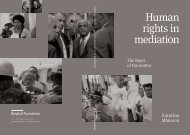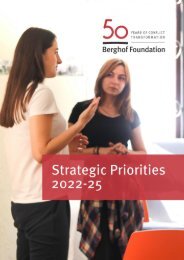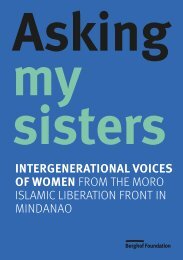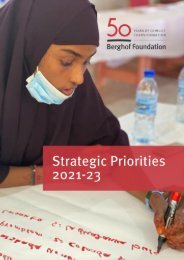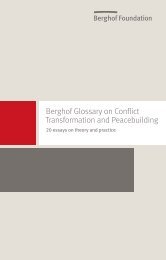Berghof Foundation: 50 years of conflict transformation
This book provides an overview of the Berghof Foundation’s work and impact over the past 50 years and sheds light on the challenges ahead of peacebuilding.
This book provides an overview of the Berghof Foundation’s work and impact over the past 50 years and sheds light on the challenges ahead of peacebuilding.
You also want an ePaper? Increase the reach of your titles
YUMPU automatically turns print PDFs into web optimized ePapers that Google loves.
Foreword by the<br />
Executive Director<br />
The <strong>Bergh<strong>of</strong></strong> <strong>Foundation</strong><br />
is a very special organisation —<br />
an intellectual and ethical space<br />
unlike any other.<br />
In 2021, in new premises, under new management,<br />
using new methods and operating in a world utterly<br />
different from what it was when <strong>Bergh<strong>of</strong></strong>’s visionary<br />
founder created it half a century ago, one can still<br />
see in today’s far larger organisation some <strong>of</strong> the<br />
elements that made it special back then. Deep pride<br />
in the organisation’s work on peacebuilding, mediation<br />
and other forms <strong>of</strong> <strong>conflict</strong> <strong>transformation</strong> has been<br />
a constant feature.<br />
Established to help reduce East-West<br />
tensions at the height <strong>of</strong> the Cold War, its willingness<br />
and ability to adapt to changing circumstances<br />
have always been <strong>Bergh<strong>of</strong></strong>’s strengths, while its<br />
fundamental goals and principles have stayed the<br />
same. The fall <strong>of</strong> the Berlin Wall in 1989 and the<br />
subsequent disintegration <strong>of</strong> some major states<br />
led to key changes: as a result <strong>of</strong> the wars in former<br />
Yugoslavia and the Caucasus, <strong>Bergh<strong>of</strong></strong> shifted its<br />
focus towards intra-state <strong>conflict</strong>s.<br />
The ill-conceived “Global War on Terror”<br />
after 2001 brought further shifts, with our work<br />
focusing on resistance and liberation movements<br />
that wanted support in negotiations, and on making<br />
societies more inclusive.<br />
More recently, <strong>Bergh<strong>of</strong></strong> has been adapting<br />
to a digitalised world in which mass disinformation<br />
and hate speech have become hallmarks; to a planet<br />
facing ecocide through climate change; to the<br />
uncertainties and constraints brought about by the<br />
COVID-19 pandemic; and to dramatic changes in the<br />
status and postures <strong>of</strong> world superpowers.<br />
Our founder Georg Zundel created and<br />
supported a number <strong>of</strong> institutions. In 2012, three<br />
<strong>of</strong> them were merged into one. This has meant that<br />
the current <strong>Bergh<strong>of</strong></strong> <strong>Foundation</strong> is now based on<br />
a triad <strong>of</strong> complementary activities — one <strong>of</strong> the<br />
features <strong>of</strong> <strong>Bergh<strong>of</strong></strong> that make us truly unique —<br />
combining operational support for regional peace<br />
initiatives; practical research into multiple layers<br />
<strong>of</strong> <strong>conflict</strong> <strong>transformation</strong>; and global learning with<br />
peace education.<br />
During its five decades <strong>of</strong> intensive work,<br />
<strong>Bergh<strong>of</strong></strong> has managed to build up a solid reputation<br />
in two broad areas. The first is its intellectual and<br />
practical competence; the second is the ethical<br />
underpinnings that lie behind its activities. For <strong>Bergh<strong>of</strong></strong><br />
staff, peace has always signified much more than<br />
the absence <strong>of</strong> violent <strong>conflict</strong>, and this is why such<br />
emphasis is placed on dealing systemically with<br />
the complex structural, root causes <strong>of</strong> <strong>conflict</strong> in all<br />
their forms. Working on a number <strong>of</strong> mediation and<br />
peacebuilding tracks, <strong>Bergh<strong>of</strong></strong> constantly analyses<br />
evolving conditions in the areas, countries and<br />
regions where it operates. And then it puts its ideas<br />
into effect using a wide variety <strong>of</strong> approaches and<br />
techniques, including grassroots reconciliation and<br />
peace education, participatory research and policy<br />
reviews, and high-level dialogue and mediation<br />
support. The aim is to tackle the underlying causes<br />
<strong>of</strong> <strong>conflict</strong>s — human rights violations, exclusion and<br />
discrimination, as well as manipulation <strong>of</strong> historical<br />
narratives — thereby reducing tensions<br />
and transforming <strong>conflict</strong>s.<br />
Reviewing the record, one can identify four<br />
broad strokes <strong>of</strong> good fortune that seem to have<br />
consistently helped <strong>Bergh<strong>of</strong></strong> on its peacebuilding<br />
path. The first is the quality and commitment <strong>of</strong> its<br />
staff since the very beginning. The second is the<br />
unstinting support <strong>of</strong> the founder and his family.<br />
The third is our long-standing cooperation with<br />
many dedicated partners in <strong>conflict</strong> contexts around<br />
the world. And the fourth is that we are based in a<br />
country which, to my mind, has an unmatched record<br />
in dealing with its own past and in implementing<br />
a foreign policy that strongly promotes mediated<br />
peace, human rights, democracy and environmental<br />
values — although this does not mean that over the<br />
decades, especially in our earlier <strong>years</strong>, <strong>Bergh<strong>of</strong></strong> has<br />
not criticised German policy whenever it felt that this<br />
was necessary. Our organisation continues to receive<br />
generous project funding, mainly from the German<br />
Federal Foreign Office, as well as from a number <strong>of</strong><br />
other important donors. We are deeply grateful to<br />
everyone concerned in all four areas.<br />
In the pages that follow, which are based on<br />
contributions received from most <strong>of</strong> the approximately<br />
100 staff who currently work for the organisation,<br />
we have attempted to provide a flavour <strong>of</strong> <strong>Bergh<strong>of</strong></strong>’s<br />
work over the past <strong>50</strong> <strong>years</strong>, and show what it is<br />
really about. It demonstrates great breadth <strong>of</strong><br />
activity and an extremely impressive record <strong>of</strong><br />
achievement. Building on the foundational work <strong>of</strong><br />
our predecessors, <strong>of</strong> whom we are so proud, and on<br />
the efforts <strong>of</strong> our colleagues in the field, and learning<br />
from all our experiences, both good and bad, we have<br />
little doubt that whatever form our 100th anniversary<br />
takes, it will reflect a record that is truly remarkable.<br />
Andrew Gilmour<br />
Executive Director<br />
<strong>Bergh<strong>of</strong></strong> <strong>Foundation</strong><br />
Berlin<br />
Summer 2021<br />
6<br />
7





